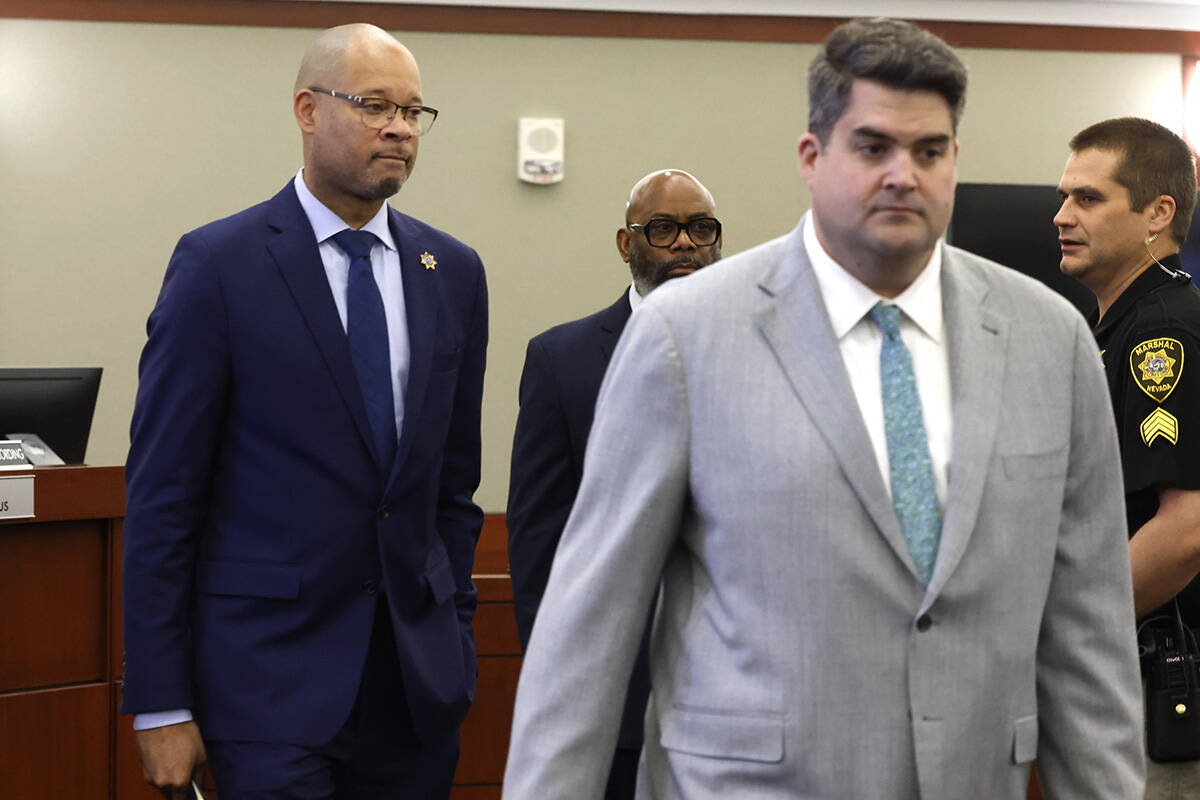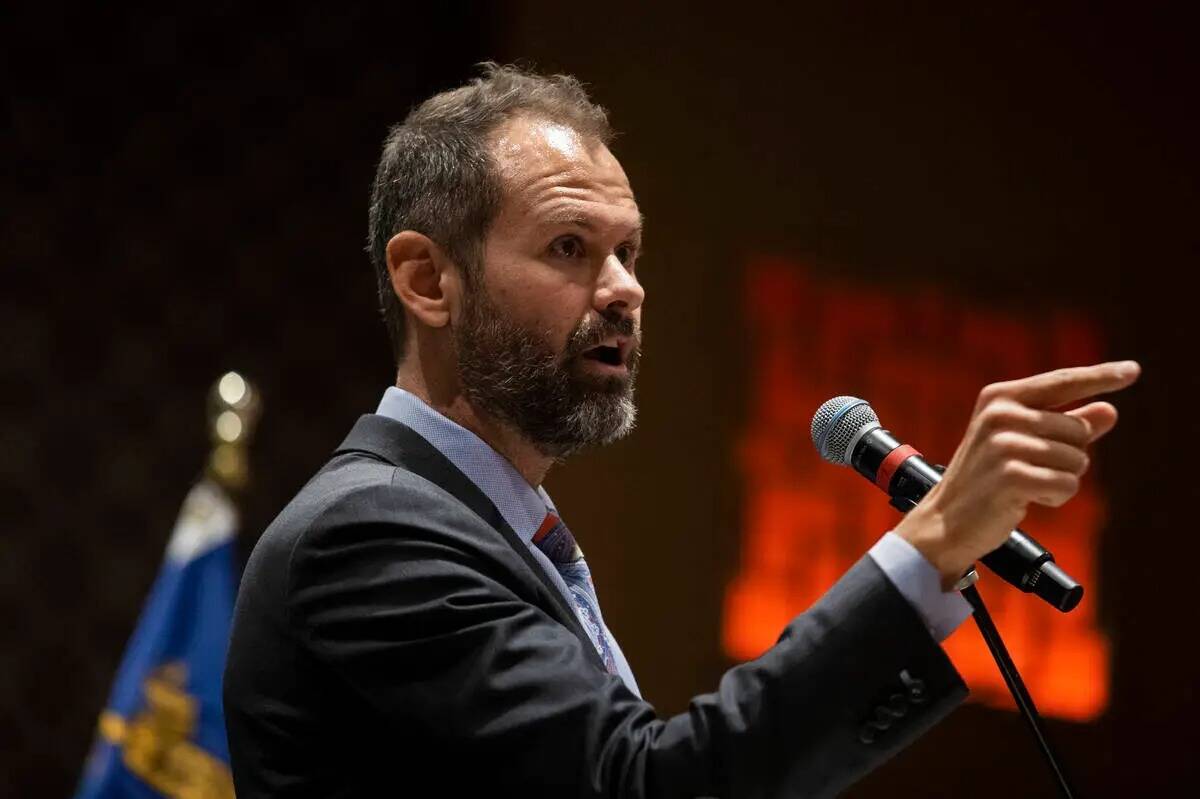Jurisdiction debate hovers over Nevada ‘fake electors’ case
Nevada’s office of the attorney general and the lawyers for the state’s so-called fake electors are battling it out over whether the case can be tried in Clark County.
In January, the lawyers filed a motion to dismiss charges against the six Republicans indicted by a grand jury in Clark County District Court for submitting fake electoral documents declaring Donald Trump the winner of Nevada’s 2020 election.
They had argued that because the alleged offenses occurred in Carson City — where the documents were signed — and in Douglas County — where the documents were mailed — the Clark County grand jury lacked jurisdiction.
The attorney general’s office, which is prosecuting the case, responded in opposition to the motion to dismiss on Feb. 8, arguing that when an offense is committed partially in one county and partially in another, “the venue is in either county.” On Feb. 13, attorneys for the defendants rebutted that there is no evidence the alleged crimes had anything to do with Clark County.
Judge Mary Kay Holthus is scheduled to hear the case March 4, where both motions to dismiss and motions to continue the trial are scheduled to be discussed. A jury trial is set for March 11.
AG’s office: Part of the alleged crimes took place in Clark
In her motion, Chief Deputy Attorney General Alissa Engler argued that the actions of the defendants began in Clark, Douglas and Storey counties when they “began a conspiracy and started planning their crimes by drafting and revising the false or forged instruments they later printed, executed, offered for filing, and uttered.”
Engler alleged that both Michael McDonald and Jesse Law, two of the defendants, were in Clark County while they were “participating in the drafting and revision process of the false or forged instruments.”
McDonald and Law made several phone calls to each other during the time frame in which emails were exchanged about the proposed draft language of the documents, Engler alleges.
The fake documents were also delivered to a judge at the Lloyd D. George Courthouse in Las Vegas, further giving Clark County jurisdiction, Engler argued.
“All Defendants are required to stand trial in any venue where some portion of the acts or effects requisite to the crime occurred,” Engler wrote.
After the Nevada Supreme Court ruled in December 2020 that Joe Biden won the election in Nevada, the defendants “undeniably had knowledge that they were not the presidential electors for Nevada,” Engler wrote. Still, they took steps to execute electoral documents claiming the opposite, that Donald Trump had won the election and that they were therefore the presidential electors for Nevada.
‘Fake electors’ attorneys: No evidence for crimes in Clark
“The reality is that this case has nothing to do with Clark County,” the lawyers, headed by Las Vegas Attorney Richard Wright, wrote in their Feb. 13 response. “Imagining that mere presence in Clark County after the Nevada Supreme Court’s decision and before the alleged crime and the mere fact that Defendants happened to communicate with each other around the same time show intent is nothing more than bare speculation.”
In response to allegations that McDonald and Law were in Clark County between Dec. 9, 2020 and Dec. 13, 2020 — therefore giving Clark County the jurisdiction — the lawyers argue that Law was traveling outside of Clark County during that time.
But also, just the physical presence of McDonald and Law in Clark County is not sufficient circumstantial evidence to show the Clark County grand jury has jurisdiction, they wrote.
Emails that McDonald and Law were copied on do not show any criminal intent or act by the two of them, the attorneys wrote, and there is nothing unusual about leaders of the Nevada Republican Party communicating with each other.
There is no evidence that McDonald or Law participated in drafting or revising of documents while in Clark County, the attorneys argued. The fact that they received emails or exchanged phone calls while in Clark County and other people sent emails does not show that they participated in any alleged conspiratorial acts in Clark County.
With regard to the document that had been delivered to a judge at Lloyd D. George Courthouse, the document was never delivered in Las Vegas but rather was forwarded unopened to the judge’s chambers in Reno, the defendants claim.
Nevada cannot infer that the defendants formed the intent to defraud, “let alone that they did so while in Clark County,” their attorneys argued.
The defendants had a right to continue to challenge the Supreme Court decision, the defendants’ attorneys argue.
“Instead of trying to trick anyone with their Certificate, the Defendants were exercising their First Amendment rights not only to criticize and challenge Nevada’s election process but also to preserve their rights, also protected by the First Amendment, to petition the courts and seek other avenues to address their concerns about Nevada’s purported election irregularities.”
Joint Reply Oppos Mtn Dismiss (2) by Jessica Hill on Scribd
Plaintiffs’ reply
Contact Jessica Hill at jehill@reviewjournal.com. Follow @jess_hillyeah on X.



















